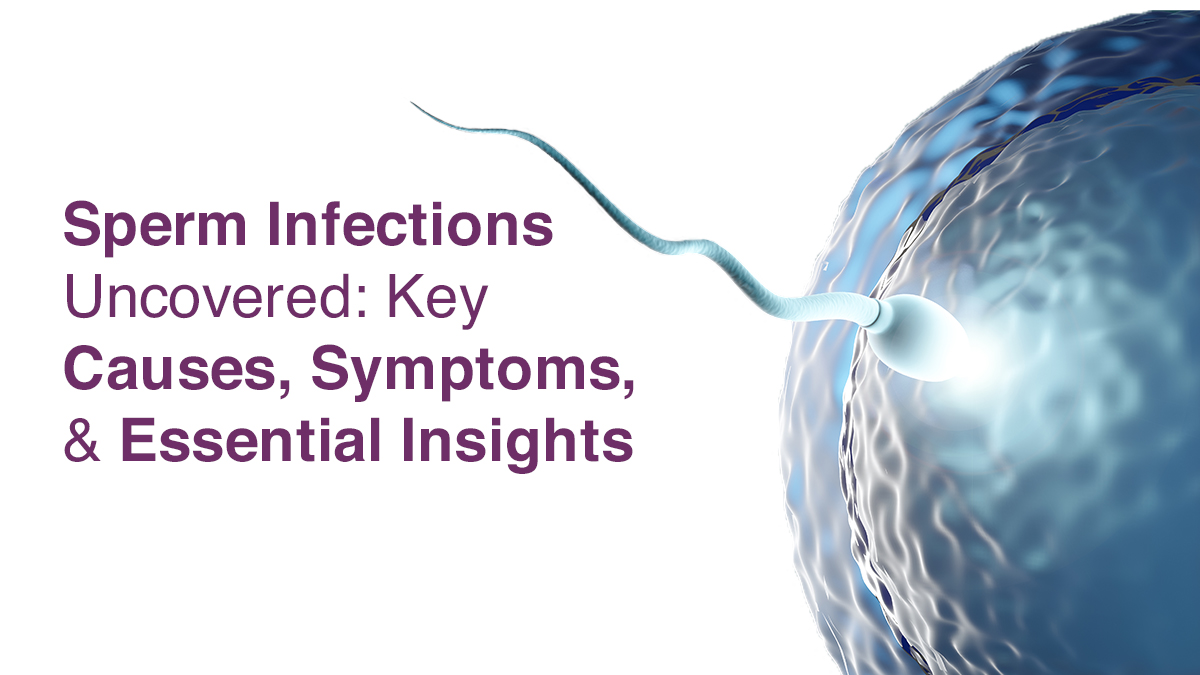Male fertility is one of the most important aspects of reproductive processes and is influenced by lifestyle, hormonal, and physical factors. This entails the continuous delivery of sperm, one of the critical functions of reproduction. The main contributing factors towards the negative effect on male fertility include chronic stress, environmental toxins, and hormone imbalances. Other infections affecting the male genitalia that may affect infertility are prostatitis or epididymitis. Such infections may affect the quality, motility, and DNA integrity of sperm; therefore, prompt diagnosis and treatment are essential.
What are sperm infections?
Low sperm numbers or poor sperm are the main causes of male infertility. To help your partner conceive without any issues, you should take care of the sperm’s health. Unhealthy sperm is largely caused by dietary habits and lifestyle choices. You will have healthy sperm only if you make the required changes. The process of creating fresh, healthy sperm takes roughly three months.
Types of Sperm Infections
Sperm infections can arise from different sources and affect various parts of the male reproductive system. Let’s take a look at the most commonly identified types based on their origin and underlying cause.
Bacterial Infections
Epididymitis: Inflammation of the epididymis, frequently brought on by STIs such as Neisseria gonorrhoeae or Chlamydia trachomatis.
Prostatitis: An infection of the prostate gland that causes ejaculatory dysfunction and uncomfortable urination.
Viral Infections
Mumps Orchitis: Mumps-related testicular inflammation that may result in decreased sperm production.
Human Immunodeficiency Virus (HIV): The quality of sperm can be affected either directly or indirectly by the human immunodeficiency virus (HIV).
Fungal Infections
Although uncommon, fungal infections can impact sperm and male reproductive system organs in immunocompromised people.
Parasitic Infections
Trichomoniasis: A parasitic infection spread through sexual contact that impairs semen quality and causes urethritis.
Key Causes of Sperm Infections
Several medical, lifestyle, and environmental factors can contribute to the development of sperm infections. Understanding these causes helps in identifying risk factors and planning appropriate treatment steps.
- Sexually transmitted infections (STIs): Chlamydia and gonorrhoea are two examples of infections that can be spread during intercourse and impact sperm.
- Prostatitis: The health and function of sperm can be impacted by inflammation or even an infection of the prostate gland.
- Urinary tract infections (UTIs): Bacterial infections in the urinary tract can occasionally transfer to the reproductive system, resulting in infections of the sperm.
- Orchitis: The production and quality of sperm can be affected by testicular inflammation or infection.
- Epididymitis: Sperm infections can result from inflammation or infection of the tube that carries and stores sperm, known as epididymitis.
- Balantis: Sperm infections may result from an infection or inflammation of the penis’s head or foreskin.
- Varicocele: The health of the sperm may be impacted by the warming of the testicles caused by enlarged veins in the scrotum.
- Unprotected sexual intercourse: Using a barrier technique (such as a condom) during sexual activity exposes the sperm to possible illnesses.
- Injury or trauma: Bacterial infections in sperm can result from trauma or injury to the testicles or reproductive system.
- Obstructed reproductive ducts: When sperm-carrying ducts are blocked, germs can build up and cause infections.
- Poor personal hygiene: Bacterial growth and sperm infections may be more likely if the vaginal area is not cleaned thoroughly.
Symptoms of Sperm Infections
Pain, discharge, or discomfort during ejaculation are possible symptoms. Some sperm infections, nevertheless, don’t cause any symptoms. Male infertility can be caused by a variety of variables, including pathogenic microorganism infections, lifestyle, environment, health, and medical resources. Numerous reproductive illnesses can result from bacterial infections of the male reproductive system.
Bacteria, viruses, and parasites are among the microorganisms that can infect the male reproductive system and cause several inflammatory reactions that reduce male fertility. Bacteria typically retrogradely infect the testes, vas deferens, prostate, epididymis, urethra, and seminal vesicles. Several cases of male infertility are caused by bacterial infections, such as those caused by Brucella, Neisseria gonorrhoeae, and Chlamydia trachomatis.
Diagnosis of Sperm Infections
In diagnosing infections of sperm, symptoms like vaginal pain, swelling, fever, discharge, or reproductive problems and a history of STIs or recent surgeries need to be investigated. A physical examination will look for problems with the reproductive organ. Other important tests are blood tests for inflammation, microbiological cultures for identification of pathogens, and semen analysis for white blood cells and sperm quality.
Advanced PCR tests can detect specific bacteria, while imaging tests, such as an ultrasound, are carried out to determine whether or not any abnormalities exist in the prostate or scrotum. Early and accurate use of these techniques is essential in providing effective treatment of infections and prevention of complications such as infertility or chronic pain.
Treatment Options for Sperm Infections
The cause determines the course of treatment. Antiviral drugs treat viral causes such as herpes, while antibiotics are the main treatment for bacterial sperm infections. Antifungal and antiparasitic drugs may be administered if the infection is suspected to be caused by fungi or parasites. The selection of anti-inflammatories or painkillers can be used to treat pain and inflammation and, therefore, drainage of abscesses by combining this treatment with surgery.
Recurrence can be avoided if you modify your lifestyle, such as by avoiding unprotected sexual intercourse and practicing proper hygiene.
Both partners should be treated for sexually transmitted infections. Early detection and the initiation of treatment are needed to restore reproductive health and prevent infertility and chronic reproductive tract complications.
Preventing Sperm Infections
Minimizing infection risks can be attained by practicing proper sanitation, indulging in safe sex practices, and wearing protective gear. The controlling of chronic ailments, a good diet, and regular medical checkups would promote reproductive health. To avert reinfections, maintain fertility and drink increased amounts of water, do not share personal items, and treat medical conditions as they develop.
Potential Complications of Untreated Sperm Infections
Preventing infection involves practicing safe sex, keeping oneself clean, and wearing protection. Support reproductive health by controlling chronic illness, eating a balanced diet, and seeking regular checkups. To prevent reinfections and save fertility, never share personal items, drink plenty of water, and treat diseases as early as possible.
When to Seek Medical Advice?
If you suffer from symptoms like infertility, oedema, irregular discharge, painful urination, or ongoing genital pain, consult a doctor. If you have a history of infections, unprotected intercourse, or genital damage, an early evaluation is crucial. Early intervention preserves reproductive health and avoids complications.
Conclusion
If sperm infections are not treated, they can have a major effect on male fertility. To prevent and manage these infections and protect long-term reproductive health, it is essential to practice safe sex, maintain proper cleanliness, and seek medical attention as soon as possible. To ensure timely treatment and understand how to improve sperm health, you can visit the Oasis Fertility Clinic near you immediately. Moreover, you can also contact us at 1800-3001-1000 or use the live chat facility for prompt assistance.

